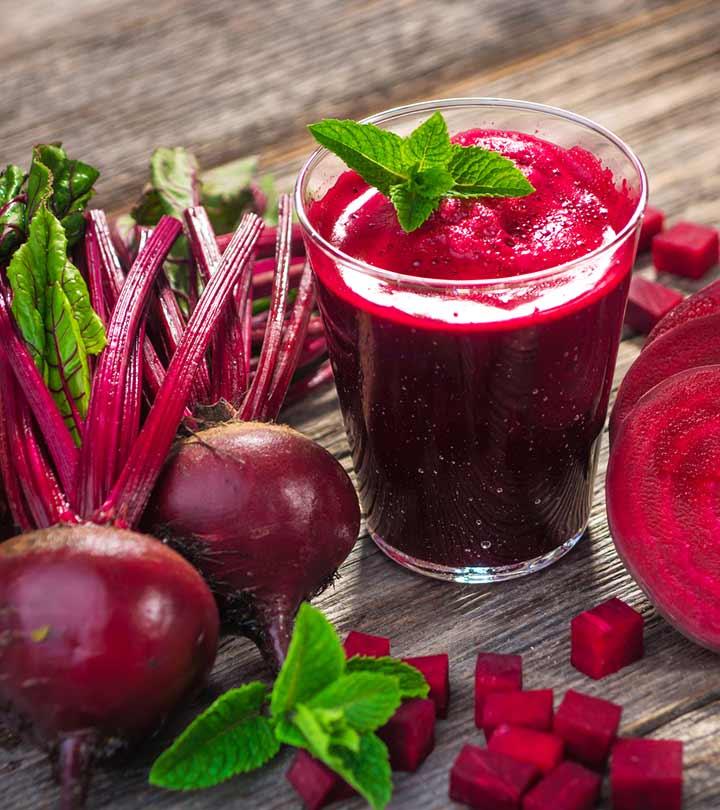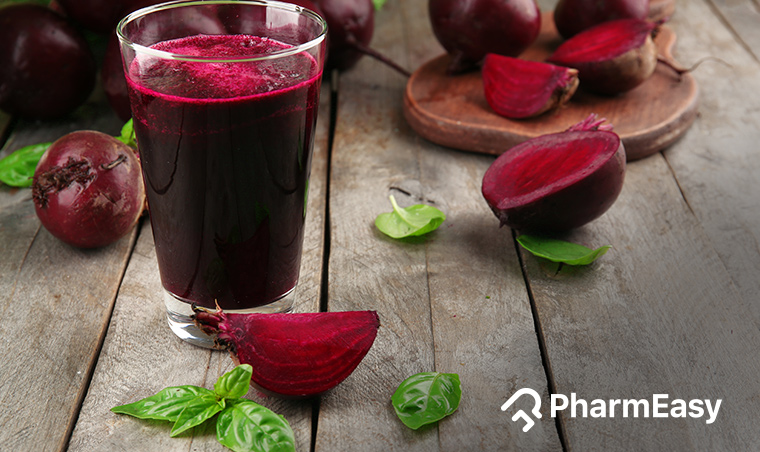Beetroot juice can indeed encourage bowel movements. Its high fiber and nitrate content help improve digestion.
Exploring the effects of beetroot juice on digestion reveals its potential to streamline bowel movements. Beetroot, a vibrant and nutritious root vegetable, is loaded with dietary fiber, a crucial element for maintaining a healthy digestive system. Consuming fiber-rich foods like beetroot juice can increase stool bulk and regularity, thus combating constipation and promoting a more predictable bowel routine.
The nitrates present in beetroots also play a significant role in promoting smooth muscle function in the gut, enhancing the digestive process. For those seeking natural alternatives to stimulate their digestive health, incorporating beetroot juice into their diet could be beneficial. Its natural properties align well with holistic approaches to wellness, making it an ever-popular choice for digestive support.
The Colorful World Of Beetroot
Welcome to the vibrant and healthful universe of beetroot, a root vegetable known for its deep crimson hue and a multitude of health benefits. This nutritional powerhouse not only packs a punch with vitamins and minerals but also piques curiosity for its potential effects on digestion, including bowel movements.
Rich In Nutrients And Fiber
Beetroots rank high on the nutritional chart. Their composition includes essential vitamins and minerals such as:
- Vitamin C, vital for immunity and skin health
- Potassium, key for heart and muscle function
- Magnesium, which supports hundreds of biochemical reactions
Importantly, beetroots boast a significant fiber content. Fiber is a cornerstone of digestive health, aiding in regular bowel movements. Consuming beetroot juice replenishes the body with this crucial nutrient, potentially increasing stool frequency and contributing to a healthier gut.
Natural Colors And Body Responses
The distinct pigments in beetroots come from betalains – natural compounds with significant antioxidant properties. These pigments are also responsible for the potential change in stool color, a harmless effect termed beeturia. A glass of beetroot juice introduces these vibrant colors into your digestive system, which might show up later during elimination. It acts as a natural dye passing through the intestinal tract, often leaving a startling but safe red coloration.
Take note: the change in stool color usually occurs within a few hours to a couple of days after consumption. So, don’t be alarmed if things look a bit more colorful during your next bathroom visit after enjoying beetroot juice.

Unveiling The Digestive Powers Of Beetroot Juice
Does your digestive system feel sluggish? Beetroot juice might be the kick-start you need. This vibrant root vegetable is not just a colorful addition to your diet. Its juice holds secrets to improved digestive health. Let’s dive into the world of beetroot juice and explore its effects on your digestive tract.
Juicing For Improved Digestion
Beetroot juice is rich in nutrients that promote good digestion. Its fiber content is high even after juicing. This helps keep the digestive system running smoothly. Natural sugars in beetroot juice provide quick energy for gut-friendly bacteria.
- Increases fiber intake: Keeps the intestines clean.
- Natural sugars: Feed healthy gut bacteria.
- Rich in antioxidants: Fights inflammation in the gut.
Beetroot’s Impact On Bowel Movements
Drinking beetroot juice may lead to more regular bowel movements. Beets contain betacyanin, the pigment that gives them their red color. It speeds up your digestive track. An effective detox for your body, beetroot juice can result in increased stool frequency.
| Nutrient | Effect on Digestion |
|---|---|
| Fiber | Softens stool, improves movement |
| Betacyanin | Speeds up digestive process |
| Magnesium | Relaxes muscles, eases passage |
Magnesium is another key component in beetroot juice. It relaxes digestive muscles and makes passing stool easier.
Dyes And Digestion: A Colorful Tale
Beetroot juice adds a vibrant splash to your diet, but it can also lead to surprising changes when you visit the bathroom. This natural dye has the power to transform your digestion into a more colorful experience. Paying attention to these changes is important. Let’s discover what happens inside your body and on your plate!
Why Your Poop Might Change Color
Eating beets can color your stools in shades of red or pink. Don’t panic! This is a harmless reaction to the betacyanin pigment found in beets. Here are some reasons why your poop might change color:
- Food with strong pigments: Like beets or berries.
- Medications: Some can alter stool colors.
- Supplements: Ingredients in supplements can also have an effect.
Harmless Or A Warning Sign?
Not all changes signify something is wrong. If beetroot juice is your latest craving, expect a temporary color shift. But sometimes, a change in stool color can be a red flag for health issues. A table can help you understand when to seek advice:
| Stool Color | Possible Cause | Action to Take |
|---|---|---|
| Red/Pink | Beetroot Consumption | Monitor, usually harmless |
| Black/Tarry | Bleeding in Upper GI Tract | Seek medical attention |
| Yellow/Greasy | Maldigestion or Malabsorption | Consult a doctor |
If concerned, always check with a healthcare professional. Knowing your body is key to great health. Remember, enjoying beetroot juice is not only tasty but also generally safe for most people.

Detoxifying Effects Of Beetroot Juice
Many people seek natural ways to cleanse their bodies. Beetroot juice stands out as a powerful detoxifier. Its deep crimson hue hints at its potency in flushing out toxins. As with many things in nature, color signals nutrient richness. The vibrant red of beetroots signals the presence of powerful compounds that aid in digestion and detoxification processes, leading to improved bowel movement.
Cleansing Naturally With Beetroot
Beetroots brim with fibers and nitrates. These key elements help the gut work better. Dietary fiber bulks up the stool, easing its passage. Nitrates support increased blood flow, improving digestion. This natural combination can lead to more regular bowel movements. In other words, beetroot juice might just help you poop.
- Bulks up stool for smoother bowel movements
- Stimulates blood flow to the gut for better digestion
- Supports gut bacteria for a healthy microbiome
The Role Of Antioxidants
Antioxidants in beetroots are heroes in our bodies. They battle harmful molecules called free radicals. Betalains, which give beetroots their color, are such antioxidants. They help protect the digestive system from damage. This protection could keep your system functioning smoothly. A healthy digestive system often means more regular bathroom visits.
| Antioxidant | Function |
|---|---|
| Betalains | Protect cells in the digestive tract |
| Vitamin C | Helps repair body tissues |
| Flavonoids | Support a healthy immune response |
Such antioxidants ensure your digestive system works without hiccups. A smooth-running digestive process is key to regular bowel movements. Combining beetroot juice with a balanced diet enhances its benefits. This bright red drink could be your answer to a natural cleanse.
Practical Tips For Beetroot Consumption
Beetroots boast a wealth of health benefits, including aiding in digestion. Full of fiber, beetroots can help regulate your digestive system and even encourage bowel movements. However, working them into your daily diet requires some know-how.
Incorporating Beetroot Juice Into Your Diet
Start with small sips to see how your body reacts. Here’s a quick guide on how to integrate beetroot juice smoothly:
- Mix beetroot juice with other vegetable juices like carrot or spinach to mellow the taste and ease your body into it.
- Add a splash of lemon for extra flavor and Vitamin C.
- Dilute with water if the flavor is too potent or if your stomach is sensitive.
- Combine with fruit for a sweeter drink. Apples or oranges pair perfectly.
Remember, introduce beetroot juice into your routine gradually to prevent digestive upset.
When To Seek Medical Advice
Sometimes, dietary changes like adding beetroot juice can trigger issues. Pay attention to these signs:
- If you experience stomach pain or cramping.
- When you notice consistently loose stools.
- If there’s a drastic change in your bowel movement habits.
Seek a doctor’s guidance if any issues persist. It’s crucial to ensure there’s no underlying health condition.

Frequently Asked Questions For Does Beetroot Juice Make You Poop
Can Beetroot Juice Affect Bowel Movements?
Yes, beetroot juice can affect bowel movements due to its high fiber content and the presence of betacyanin, which may give stools a red color. This can lead to more frequent and softer stools for some individuals.
Is Beetroot Juice A Natural Laxative?
Beetroot juice is not a traditional laxative but can have a mild laxative effect. This is because it’s rich in fiber and nitrates, which can improve digestion and promote regularity.
How Does Beetroot Juice Improve Digestion?
Beetroot juice contains fiber and nitrates that help improve digestion. These compounds stimulate the gut, increasing nutrient absorption and promoting regular bowel movements.
How Quickly Does Beetroot Juice Make You Poop?
The time beetroot juice takes to affect bowel movements varies per individual. Some may notice changes within a few hours, while for others, it may take a day or so.
Conclusion
To wrap up, beetroot juice does seem to have a mild laxative effect for some. This colorful drink is packed with fiber and nutrients, aiding digestion. Remember, everyone’s body reacts differently, so moderation is key. Give it a try and see how it works for you.
Happy juicing – and possibly, smoother digestion too!

